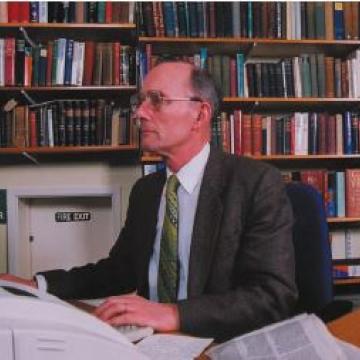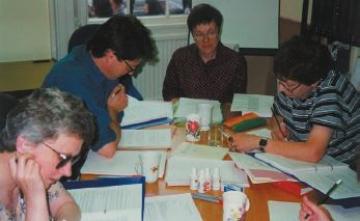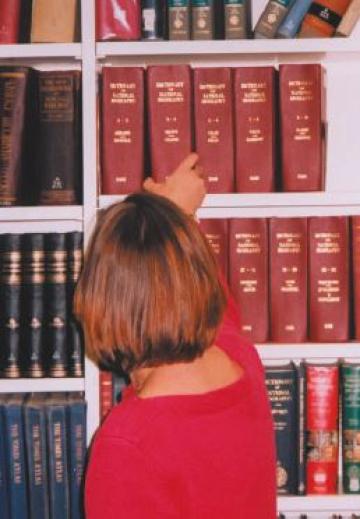Buried Treasure in Oxford’s Modern History Faculty
The Modern History Faculty exists within a wider historical community. Professor Brian Harrison, Editor of the Oxford Dictionary of National Biography charts the Oxford contribution to the largest historical enterprise in Britain today.
Undergraduates quite understandably assume that the world revolves around them, and that their tutors’ main preoccupation in life is with giving them tutorials, perhaps with the odd lecture thrown in. Oxford does indeed put an unusual amount of effort into teaching, especially during term, but in recent years research has been gradually moving up among the priorities of the Modern History Faculty, as of other Oxford faculties. The rising priority is not just for better supervision of graduate students, but for the tutor’s ‘own work’, as it is often called: for the articles and books which tutors write largely in vacations and sabbatical terms.

Prof. Brian Harrison, Editor of the Oxford Dictionary of National Biography
Yet even the undergraduate inquisitive about the Faculty’s research would be unlikely to come across one of its prize trophies, for the Editor of the Oxford Dictionary of National Biography [Oxford DNB] does not give tutorials or lecture, and works in a stately building – 37a St. Giles’ – which few undergraduates know about. He alone in the building holds a college fellowship, and the research team there is funded, not by the University of Oxford, but by the Oxford University Press. In any American university this would be called a research institute, and the university would be eager to claim credit for what it does, but the University of Oxford hides its light under a bushel, and few know that the Oxford DNB happens in Oxford at all.
The Dictionary of National Biography recently acquired the prefix ‘Oxford’ because since 1992 it has received £19,000,000 from the Oxford University Press (OUP) and £3,000,000 from the taxpayer through the British Academy to fund a world-wide army of 10,000 contributors writing 50,000 biographies ranging from a hundred to 30,000 words, on people who had some impact on British life – from Pytheas in the fourth century BC up to those who died on or before 31 December 2000. 37a St Giles’ houses a remarkable collaborative venture which unites a team of 18 on the academic staff to a similar number of full-time publishing staff (bibliographers, computing experts, copy-editors and administrators), together with part-timers and home-workers to reinforce them. If you go there you will find a lot of very busy researchers, most of them in front of word-processors, surrounded by books, with ready access to a huge computerized database and to an impressive array of files – 10,000 green ones for contributors, 50,000 yellow ones for their articles. A battery of people sit entering material from forms into our database, and heaps of proofs lie everywhere. We will publish simultaneously on-line and in 60 volumes in autumn 2004, and thereafter the Dictionary will be regularly updated.
The Dictionary is a prize example of Victorian philanthropic enterprise. It springs from the vision of a well-known Victorian publisher, George Smith, who made a lot of money on the side from selling Apollinaris Water, a brand of what we now describe as mineral water. His original plan was to divert some of the profits into creating a dictionary of ‘universal biography’. The Dictionary’s first editor Leslie Stephen diverted him from this idea into funding a dictionary of British national biography, and from 1885 to 1900 it rolled off the presses in 63 volumes produced every quarter, and rapidly became the national institution known as the DNB.
During the twentieth century the DNB was supplemented by decennial or (latterly) quinquennial volumes containing articles on those who died after the main work had been published, and in 1917 the Smith family entrusted the whole project to the OUP. Until the advent of modern computing technology, thorough revision – let alone regular updating – was prohibitively expensive, and the OUP understandably put off the idea till the 1980s. In 1992, however, my predecessor as Editor, Colin Matthew, launched the project for a completely revised DNB, and planned its completion in twelve years. It was a major tragedy that he died of a sudden and massive heart attack in October 1999, but the machine he had so skilfully designed carried on without him, and we are on schedule for realizing his ambition.

Rosemary Roberts conducting a training day for new copy editors
How much does the Oxford DNB owe to the Modern History Faculty? Initially not a lot. Stephen was a Cambridge man, though the second editor Sidney Lee got a second in Modern History at Balliol in 1882. There were no historian fellows of Oxford colleges among the DNB’s most prolific contributors before 1900, though the distinguished historian of seventeenth-century Britain S.R. Gardiner gave important early backing. The DNB emerged from literary London and not from the world of professional academic history. Its literary connections have always been strong, and it has always welcomed contributions from practitioners in many other subjects, and also from the informed layman.
None the less, the DNB played its part in creating the world of professional history which has now supplanted the man of letters. Apart from Lee (with 820 articles) the DNB’s workhorses consisted either of people drawn from this far-off world, or from young historians training themselves up to become the new professionals: men like A.F. Pollard (426 articles), Oxford-trained but based in London and subsequently founder of that power-house of historical professionalism, the Institute of Historical Research; T.F. Tout (240), again Oxford-trained but the creator of a powerful and highly professional rival historical school at Manchester; and C.H. Firth (222), who gained an Oxford fellowship only after the DNB had been completed. In going to the DNB as assistant editor in 1893 Pollard (in a view endorsed by Firth) thought he ‘had probably learnt infinitely more ... than I should have done by staying at Oxford, not to mention the more valuable acquirement of working habits’. Writing home in 1896, Pollard had a poor view of Oxford donnish industry. All too rarely seen in the Public Record Office, ‘they get up late and sit up late ... it does make one a little impatient to hear of their hardships; for they don’t work half as long as people do in London and think nothing of it’.
Very different is the situation now, when the ‘man of letters’ is almost a vanished species and all the dons work hard; the Oxford DNB’s 10,000 contributors are largely professional scholars who teach in universities, and many of them are members of Oxford’s Modern History Faculty. Our database doesn’t tell us exactly how many: suffice it to say that of the 200 current members of the Faculty listed on the Faculty website, 100 have names identical or similar to those of our contributors; of those, 82 have records containing the word ‘Oxford’. I know from three years’ reading of the articles that some Faculty members are stalwart friends of the Dictionary, and give up a great deal of time to it, despite their many other commitments. Nor are our contributor-historians living in Oxford confined to the ‘active’ list: 300 of our contributors have a contact address in Oxford with an institutional affiliation that includes either the word ‘university’ or the word ‘college’; no doubt these include some of our many retired but decidedly active historian authors.
It was a long time, though, before the DNB and the Faculty came together in this way. In the long stretch between 1917 and 1992 when the OUP was publishing only chronological supplements to the DNB, the DNB’s emphasis lay very much on what we now call ‘contemporary history’, which fitted better with the Social Studies Faculty (then far more historical in emphasis than it is now). It was not until 1936, after all, that Oxford’s history syllabus moved forward from 1885 even to 1914, let alone to a later period. So the informal after-dinner dinner-jacketed committees that met to choose the supplements’ subjects from the 1920s to the 1970s were by no means confined to historians. Nor was biography the respectable area of scholarly study that it is now becoming. A.L. Rowse, always a rather marginal figure within Oxford’s Modern History Faculty, saw it as the ‘key-idea’ of his ‘Teach Yourself History’ series that it would ‘open up a significant historical theme’ through ‘a biography of a great man’. His colleague Richard Pares, much more central to the Faculty, refused to contribute, and told Rowse that the business of the historian is to discuss ‘questions’; for him ‘the prime interest of history ... was to find out how things worked’.

Consulting the Dictionary of National Biography
The distinguished Balliol medievalist H.W.C. Davis, an enthusiast for research seminars, was co-editor of the first OUP-published DNB supplement (for 1912–21), but the editors from then onwards were not fellows of Oxford colleges well-known as publishing historians until Lord Blake became co-editor of the two supplements covering the years 1971 to 1985, followed by Sir Keith Thomas, consultant editor for the last of the supplements (1986–90), which was edited by Dr. Christine Nicholls. By the 1990s, however, biography and contemporary history were becoming respectable and in Colin Matthew the DNB attracted a formidable member of the Faculty as Editor.
None the less, right up to the 1980s the idea of basing the new dictionary on London University’s Institute of Historical Research was still being discussed within the OUP. When C.H. Roberts, Secretary to the Delegates of the OUP, toured the Institute in 1969, pondering on whether to launch a complete revision of the DNB, he was impressed; its library, he wrote, ‘might be custom-made for D.N.B.; there is a large collection of reference books and records of all kinds relating to individuals, besides special sections on English and Welsh (and smaller ones on Scottish and Irish) history’. The Institute’s Director, A.G. Dickens, told him that he would make provision for any of the staff to work there, and might even be able to put some rooms at their disposal. Even in 1992, when the DNB’s complete revision was launched, it was not obvious that it would gear in closely with the main concerns of Oxford’s Modern History Faculty – not just because of the Dictionary’s continuing distance from the colleges, but because of the DNB’s way of organizing its research. If the new dictionary had been planned on the model of the old, it would have been published consecutively from Abbadie to Zuylestein, with all periods studied at the same time, and with articles published simultaneously only because their subjects began with the same letter. Whereas in its earliest years the DNB was too professional for the Faculty, by the late twentieth century it was at risk of seeming too amateur.
Matthew wisely decided to publish the entire dictionary all in one go twelve years hence, and within that time-span to organize fixed-term mini-research projects by period or by subject-matter: art, business, science, medicine. Small research teams could thus be set up within the project, which could interact more closely than would otherwise have been possible with members of Oxford’s and other history faculties. Yet although Faculty and Dictionary were in this respect coming together, in another respect they were drifting apart, for British history – central to both from the 1880s to the 1980s – was ceasing to dominate Oxford’s Modern History Faculty, whereas ‘European’, American and ‘world’ history were gaining ground. Perhaps Faculty and Dictionary are perennially doomed to tiptoe round one another and never to effect a secure union. On the other hand, national dictionaries of biography are growing together, and on-line linkages may bring about, by an unexpected route, the world biographical dictionary of which George Smith dreamed. If that were to occur, this new source of divergence between Faculty and Dictionary would disappear.
But perhaps I have been moving at too elevated a level. Let me conclude by citing some of the rich and random detail that our search engines can now uncover. More than 2,700 of the 55,000 people in the Dictionary lived in Oxford, sixty of them in the Banbury Road – including the physician Sir Farquhar Buzzard, the jurist A.V. Dicey, the animal ecologist C.S. Elton, the chemist Sir Robert Robinson, and the novelist Mrs Humphry Ward. And if you are worried about your class of degree we can offer comfort. Our list of 55 people with Oxford pass degrees is distinguished, for it includes William Morris (the socialist visionary), Earl Haig, Harold Nicolson, Cecil Rhodes, John Ruskin, and Tyrone Guthrie. Not that the pass degree in the nineteenth century was as intellectually unrespectable as it became during the twentieth, as witness its distinguished intellectuals, who include Arnold Toynbee (of The Industrial Revolution), J.R. Green, John Morley, A.E. Housman, and the Egyptologist F.Ll. Griffith. Our 61 fourths include bishops of Winchester and Coventry and a dean of Chichester, and our 194 thirds can boast Sir Edward Boyle, Sir Edward Grey, Nevil Shute, Evelyn Waugh and his father, together with two notable scholars: Vivian Galbraith and Dame Kathleen Kenyon. And though Christ Church, with 1,200 of our 7,000 Oxford University subjects, romps home in the collegiate stakes, little Corpus at its back entrance manages 280.
Brian Harrison
Editor, Oxford Dictionary of National Biography



